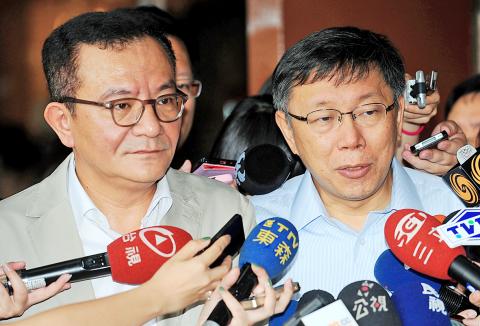The Democratic Progressive Party (DPP) yesterday made an unofficial commitment to independent Taipei mayoral hopeful Ko Wen-je (柯文哲) that it would not nominate its own candidate in the election and reached an agreement with the Taiwan Solidarity Union (TSU) that only one candidate would represent the pan-green camp in the New Taipei City mayoral election.
DPP Legislator Gao Jyh-peng (高志鵬), who served as convener of a task force for the DPP’s Taipei mayoral primary, issued a joint statement after a two-hour meeting with Ko that the DPP agreed to cooperate with the independent candidate to end the decade-long governance of the Chinese Nationalist Party (KMT) in Taipei.
The DPP pledged that it would not ask Ko to join the party should he win the election and that the party would not interfere with Ko’s personnel decisions, Gao said, adding that the 27 DPP candidates in the Taipei councilor elections would support Ko’s campaign.

Photo: Chang Chia-ming, Taipei Times
The meeting, which gathered the National Taiwan University Hospital physician and several DPP officials, including Gao and deputy secretary-general Hung Yao-fu (洪耀福), was held after Ko beat DPP Legislator Pasuya Yao (姚文智) in an opinion poll conducted by the DPP on Friday that aimed to finalize the sole pan-green camp candidate and boost the chances of defeating KMT nominee Sean Lien (連勝文).
The DPP’s decision not to nominate its own candidate in the Taipei mayoral election will not be official until the Central Executive Committee meets tomorrow, but the joint statement has erased any possibility that the party would renege on its promise to work with Ko, which at one point was creating confusion after the announcement of the poll result on Friday.
As part of the reciprocal commitment, Ko agreed to hold talks with DPP candidates in other mayoral and commissioner elections to formulate “shared platforms” and, if he wins the election, take the same positions as DPP mayors and commissioners on major policy discussions.
Ko also pledged to campaign for DPP candidates in the Taipei councilor elections.
Meanwhile, the DPP, led by former party secretary-general Su Jia-chyuan (蘇嘉全), convener of a special committee in charge of seven-in-one elections affairs, held talks with the TSU yesterday and both sides agreed to hold a public opinion survey by the end of this month to determine the final pan-green camp New Taipei City mayoral candidate in a similar format to the Taipei mayoral primary.
Former premier Yu Shyi-kun (游錫堃), the DPP’s candidate for the New Taipei City mayoral election, will compete with TSU Secretary-General Lin Chih-chia (林志嘉) in the primary poll.
The pan-green camp candidate’s rival in New Taipei City remains unclear as New Taipei City Mayor Eric Chu (朱立倫) has yet to announce whether he will seek re-election.
If Chu decides to run for the presidency in 2016, the most likely replacement candidate would be New Taipei City Deputy Mayor Hou You-yi (侯友宜).

DAREDEVIL: Honnold said it had always been a dream of his to climb Taipei 101, while a Netflix producer said the skyscraper was ‘a real icon of this country’ US climber Alex Honnold yesterday took on Taiwan’s tallest building, becoming the first person to scale Taipei 101 without a rope, harness or safety net. Hundreds of spectators gathered at the base of the 101-story skyscraper to watch Honnold, 40, embark on his daredevil feat, which was also broadcast live on Netflix. Dressed in a red T-shirt and yellow custom-made climbing shoes, Honnold swiftly moved up the southeast face of the glass and steel building. At one point, he stepped onto a platform midway up to wave down at fans and onlookers who were taking photos. People watching from inside

A Vietnamese migrant worker yesterday won NT$12 million (US$379,627) on a Lunar New Year scratch card in Kaohsiung as part of Taiwan Lottery Co’s (台灣彩券) “NT$12 Million Grand Fortune” (1200萬大吉利) game. The man was the first top-prize winner of the new game launched on Jan. 6 to mark the Lunar New Year. Three Vietnamese migrant workers visited a Taiwan Lottery shop on Xinyue Street in Kaohsiung’s Gangshan District (崗山), a store representative said. The player bought multiple tickets and, after winning nothing, held the final lottery ticket in one hand and rubbed the store’s statue of the Maitreya Buddha’s belly with the other,

‘NATO-PLUS’: ‘Our strategic partners in the Indo-Pacific are facing increasing aggression by the Chinese Communist Party,’ US Representative Rob Wittman said The US House of Representatives on Monday released its version of the Consolidated Appropriations Act, which includes US$1.15 billion to support security cooperation with Taiwan. The omnibus act, covering US$1.2 trillion of spending, allocates US$1 billion for the Taiwan Security Cooperation Initiative, as well as US$150 million for the replacement of defense articles and reimbursement of defense services provided to Taiwan. The fund allocations were based on the US National Defense Authorization Act for fiscal 2026 that was passed by the US Congress last month and authorized up to US$1 billion to the US Defense Security Cooperation Agency in support of the

HIGH-TECH DEAL: Chipmakers that expand in the US would be able to import up to 2.5 times their new capacity with no extra tariffs during an approved construction period Taiwan aims to build a “democratic” high-tech supply chain with the US and form a strategic artificial intelligence (AI) partnership under the new tariffs deal it sealed with Washington last week, Taipei’s top negotiator in the talks said yesterday. US President Donald Trump has pushed Taiwan, a major producer of semiconductors which runs a large trade surplus with the US, to invest more in the US, specifically in chips that power AI. Under the terms of the long-negotiated deal, chipmakers such as Taiwan Semiconductor Manufacturing Co (TSMC, 台積電) that expand US production would incur a lower tariff on semiconductors or related manufacturing